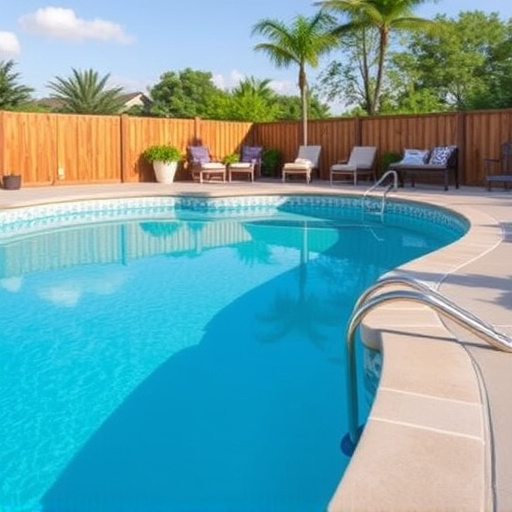Swimming pool alarms for in-ground pools are essential safety measures that detect movement and depth changes, alerting owners or lifeguards instantly. They prevent unauthorized access, accidental falls, and drowning, especially for young children or non-swimmers. Regular maintenance is crucial to ensure optimal performance, prolonging equipment lifespan and offering peace of mind. A multi-layered approach combining alarms, fences, and community awareness significantly reduces risks around inground pools.
Swimming pool safety is a top concern for every homeowner, especially with the increasing number of accidents involving water. Understanding the importance of swimming pool alarms, particularly for inground pools, is crucial. This comprehensive guide explores various types of pool alarms, installation best practices, and maintenance tips to ensure your pool area is as safe as possible. Learn how these essential tools can enhance your safety measures and protect your loved ones.
Understanding the Need for Swimming Pool Alarms
Swimming pool alarms are an essential safety measure, especially for in-ground pools. With their discreet yet powerful capabilities, these alarms serve as a crucial line of defense against accidental drowning and unauthorized access. Given that in-ground pools often offer unobstructed water entry points, they pose unique risks, particularly for young children or curious individuals who may not be strong swimmers.
Alarm systems designed specifically for swimming pools act as vigilant guards, detecting movement on the pool’s surface and sounding alerts to warn owners or nearby lifeguards. This immediate response can make all the difference in emergency situations, providing vital seconds to react and prevent potential tragedies.
Types of Swimming Pool Alarms for Inground Pools
Swimming pool alarms for inground pools come in various types, each designed to safeguard your loved ones and enhance water safety. One common type is the water level alarm, which detects any significant changes in the pool’s depth. These alarms are especially useful for preventing accidental falls into the deep end or unsupervised access, as they alert you when someone enters the pool without a companion.
Another crucial category is the proximity sensor alarm. This technology uses sensors to monitor movement around the pool’s perimeter. If someone approaches the pool unauthorized, these alarms instantly sound off, providing an early warning for potential drowning risks. Proximity sensors are highly effective in areas with obstructed views or where direct supervision might be challenging.
Installation and Maintenance Best Practices
When it comes to swimming pool protection, especially for in-ground pools, installation and maintenance best practices are paramount. Integrating advanced safety features like swimming pool alarms is a game-changer. These sophisticated devices are designed to detect potential dangers, such as unauthorized access or accidental falls, triggering immediate alerts to ensure the safety of swimmers and bystanders.
Regular maintenance plays a crucial role in keeping these alarm systems effective. This includes periodic testing, cleaning of sensors, and checking battery life to guarantee optimal performance. Proactive upkeep not only extends the lifespan of the equipment but also ensures that the pool environment remains secure and monitored at all times, offering peace of mind for pool owners and their loved ones.
Enhancing Safety with Additional Measures
Swimming pool alarms for inground pools are an essential additional measure to enhance safety, especially in residential settings with young children or inexperienced swimmers. These advanced systems are designed to detect any unexpected movement or activity around the pool, providing immediate alerts to potential hazards. By integrating such alarms into your pool’s security system, you create a robust barrier against accidental drownings and unauthorized access.
Beyond alarms, physical barriers like fences and gates play a crucial role in securing inground pools. When combined with proper training and awareness campaigns for pool owners and neighbors, these safety measures significantly reduce risks associated with aquatic environments. Regular maintenance and updating of alarm systems ensure they remain effective over time, providing peace of mind for pool owners and the broader community.
